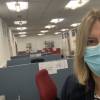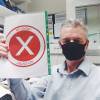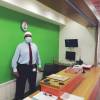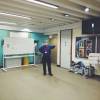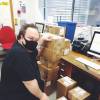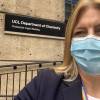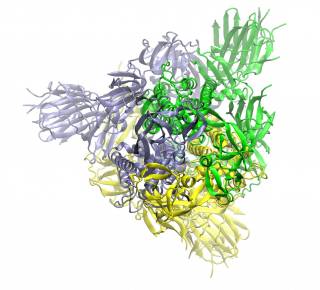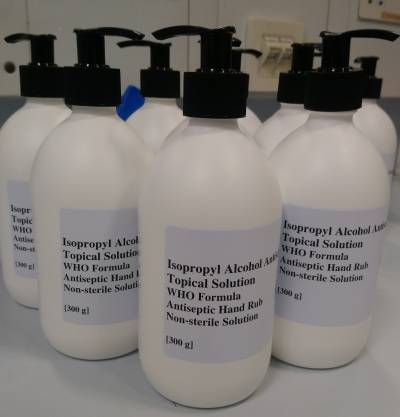Chemistry, Covid-19 and Keeping Safe
The Chemistry department began a phased opening of the Christopher Ingold Building (CIB) on the 15 June. In order to minimise the risk of spreading infection, the numbers of researchers are currently restricted to those who need to carry out experiments. The pilot initially allowed 160 lab based researchers divided into 2 cohort groups with permission to return one week in/out. Chemistry has received praise from MAPS Faculty and the Provost’s office for successfully reopening the department safely, and the protocols implemented by the department are being shared widely across College.
Returning Researchers Say
We really appreciate the careful safety measures in the UCL Department of Chemistry. Thanks for all the efforts from the lovely staff and students and wish everything returns to business as usual soon.
When walking into and around the building, there are instructions everywhere to help maintain a one-way system and keep social distancing.
Overall, the department of chemistry and our research team offers a high-quality environment to keep research working running.
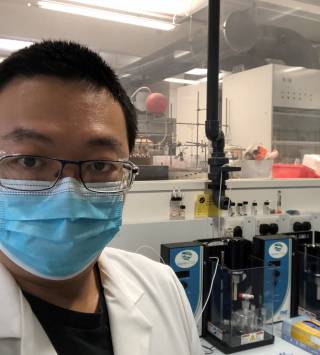
Chemistry introduced 4 priority controls for all to follow:
1. Staff who are classed as vulnerable or extremely vulnerable (at increased risk of severe illness) - must stay at home.
2. Staff are asked to keep in mind the symptoms of COVID-19 and adhere to government guidelines on self-isolation as appropriate. Do not attend work if you think you may be unwell or if someone in your household is unwell. Symptoms include a new, continuous cough, high temperature and/or loss of taste or smell.
3. Strictly follow government guidelines on social distancing, hand washing and respiratory hygiene.
4. Managers (including PIs) must keep in close contact with their teams and constantly review any work being conducted.
Some of our safety protocols are:
- Safety Documents
Head of Department, Prof. Claire Carmalt, prepared a comprehensive document outlining the plans of how the department could be opened and operated safely. The document covered all subjects from travelling safety, physical distancing, wearing of face coverings to new protocols outlining how staff can access research facilities and Stores.
The main points were condensed into a one page Code of Conduct that all staff and students must sign before being allowed to enter the CIB. All researchers are expected to follow the protocols.
- Safety Briefings & Chem Safe
Prof Carmalt held briefings and Q&A sessions for Academic staff. A further three safety briefings were held for PDRAs and PhD students via Teams. These sessions highlighted all researcher responsibilities during this time and allowed staff to raise any concerns they may have.
An anonymous reporting forum is available via Moodle for researchers to raise any concerns or feedback on how they feel the safety measures are working. Deputy Head of Operations, Professor Steve Price replies to all feedback which is shared with the department via Moodle.
- Entering the department
Signage has been placed all over the department including lab and office doors with numbers of people allowed in labs and offices.
A one-way system to move throughout the building is in place.
A welcome station in the foyer has been set up with information on UCL’s covid-19 response, a temperature check and facilities to wash hands. Hand sanitiser an be found in the foyer and disinfectant available at stations on every floor of the building.
A whiteboard is present in the foyer allowing Fire Evacuation Marshall and First aiders to identify themselves on arrival.
Researchers are required to log in when they arrive and QR codes are provided for quick access.
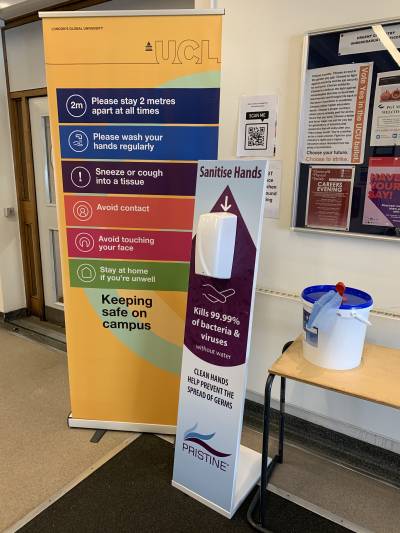
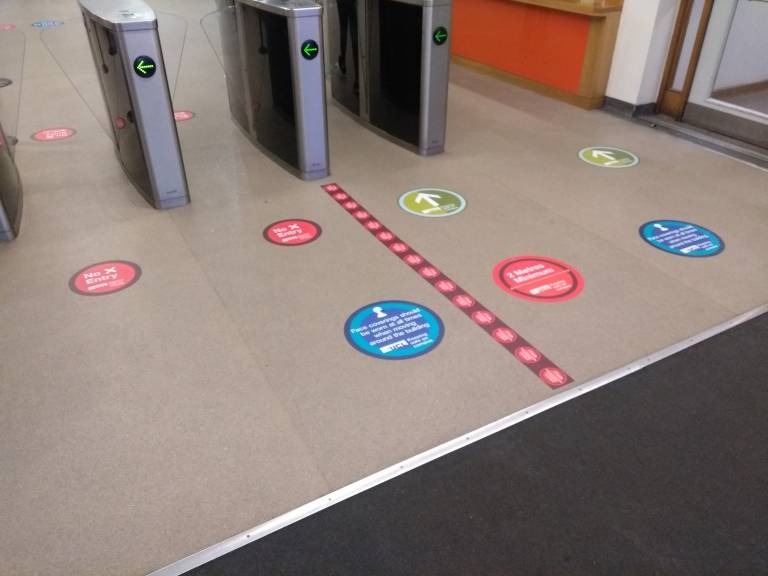
- Travelling to and from UCL
All returning staff have been encouraged to walk or cycle where they can and stagger their journey times to avoid peak travel times between 6.30 – 9.30 and 16.00 – 19.00 weekdays. Opening hours of the department are 7am – 7pm and all principle investigators have been asked to allow their staff the flexibility to arrive and depart when they feel safe to do so.
- The cohort system
A two cohort model was adopted on re-opening where larger research groups were split in half. This will ensure a maximum occupancy of approx. 25% within the building initially as non experimental staff and students remained off site. For smaller research groups that can ensure social distancing without splitting up into cohorts and that do not have the capacity to be spread across two cohorts, the need to adopt a cohort model was not be required. In such cases they had to align themselves with either cohort 1 or 2 and not alternate/switch between cohorts.
Each academic supervisor determined the members of the respective cohort. Where possible members in individual cohorts have taken into account how expertise is distributed across these two cohorts including plans for supervision of groups for when academic supervisors are not present.
After a number of weeks working with the cohort system, and given the levels of building occupancy, we were then able to raise the numbers of experimental researchers allowed into the building at any one time providing greater access to the laboratories. Researchers continue to do any office based work, such as data analysis off site. The increase in numbers was contingent on keeping within safe numbers that were set for a given area to ensure social distancing could be maintained.
- Physical distancing
It is essential that everyone abides by the Public Health England advice and remain 2m apart wherever possible while in the department.
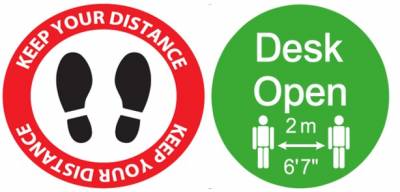
For labs/offices shared by multiple groups, there is joined up approach from all academic supervisors involved with that area. Lab occupation is not higher than 25% of the pre-lockdown occupancy of labs (lower in constrained areas if social distancing cannot be followed at 25% occupancy).
Group offices will remain open but usage is restricted to dropping off and collecting personal belongings, short rest breaks and lunch (lunch rota is agreed locally within individual research groups to ensure social distancing). Extended desk-based working is not permitted in these spaces and should be carried out at home. Desk occupancy should have researchers occupying alternating desks and will depend on the protocols written by the responsible academic supervisor.
For corridors, the same etiquette should be used as in supermarket aisles: look ahead and, if possible, make sure you will not be passing within 2 m of someone else; keep to the left.
Passing on stairwells should only take place at floor levels or intermediate landings.
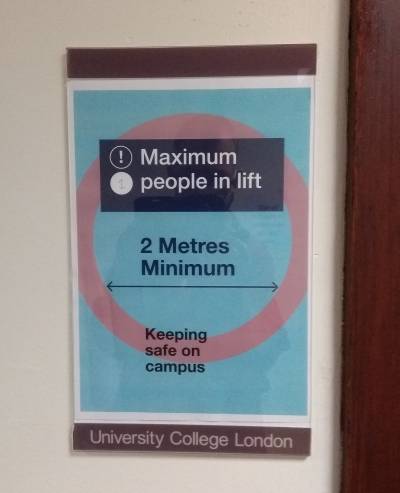
- Hand washing & cleaning guidance
Frequent hand washing should be carried out using soap and water along with regular use of hand sanitiser. Researchers must wash their hands after entering a lab and before starting work, always wash hands when leaving a laboratory.
Where toilets have multiple cubicles in the same room, the room is restricted to use by one or two people at a time - depending on the size - signage will indicate restricted use.
Disposable gloves to be worn in the labs as required but not outside of the laboratory.
A clean desk/bench area policy is mandatory. Before and after working at the bench/desk the area used must wiped down. Cleaning wipes will be available for people to clean their own work areas, at the start and end of each day, or period of use.
Bench work guidance – 2m social distancing must be observed. Do not work directly opposite another researcher.
Samples and other items should be transported through the building in suitable containers that are wiped with disinfectant before leaving the lab, do not wear gloves outside the lab.
The potential for infection through contact with shared equipment, instruments, chemicals/reagents, storage cupboards, consumables and waste containers should be considered, acknowledged and mitigated in local risk assessments.
Shared equipment that must continue to be used should be wiped down with cleaning wipes / standard disinfectants between contact by users.
All shared areas must be kept clear of personal items to prevent transmission by contaminated items. Use lockers or your dedicated workspace to store personal items
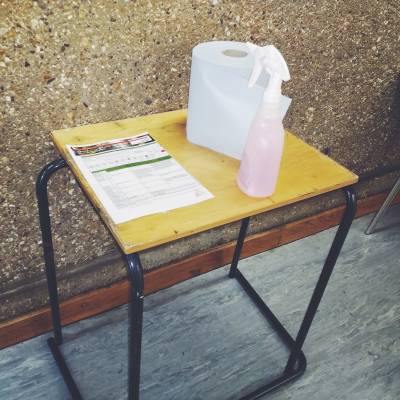
- Face Coverings
Face coverings must be worn by all staff, students and visitors when moving around UCL campuses and within buildings.
In the light of evolving scientific evidence, and Government policy, face coverings must also be worn in any office areas that are classified as having a maximum occupancy of greater than one.
In laboratory space, much of which (those labs with fume cupboards) is markedly better ventilated than office space, we strongly urge the use of face coverings. Use or not of face coverings must be included in the risk assessment of any procedure. If that assessment indicates a face covering should not be worn, then the operation must be carried out in a well ventilated area and socially distanced (2m+) from other research workers.
 Close
Close


